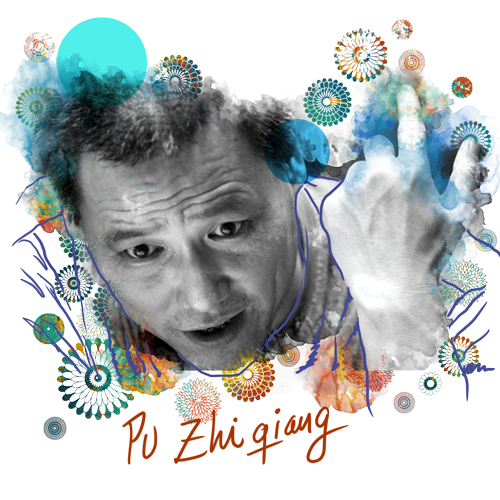One of China’s leading human rights lawyers and free speech campaigners, Pu Zhiqiang is known particularly for his way with words. “Whether in court or online, he is adept at mixing classical erudition and street vernacular,” said Chinese scholar and a friend of Pu’s Perry Link. “Twitter was made for him, but Twitter is banned in China.”
Since May 2014 Pu’s voice has been silenced, after he was arrested and charged for a series of blog posts. His trial drew huge international attention with many observers calling it a litmus test for freedom of speech in China. He was released in December 2015 to house arrest, and has made no public comment since.
Index asked three of Pu’s friends to tell his story for him.
“He was born on 11 January 1965 in Luanxian, near Tangshan, Hebei Province,” said Tong Yi, who has been a friend of Pu’s since meeting him in 1988. “His father was categorized as ‘landlord’. Therefore, when he grew up in his village, he was discriminated against because of his father. He experienced the devastating earthquake in Tangshan in July 1976.”
“Despite all the hardship he faced in those years, he grew up with an imposing physical build, as well as a standout student with a keen intellect and a photographic memory.”
As a student Pu became involved in the Tiananmen Students’ Movement. He was at Tiananmen Square in 1989, and witnessed the massacre of many of his friends and fellow campaigners. That was a turning point for him, says Link.
“He felt especially bad about the ordinary workers who protested and then died. They were not famous like some of the students and intellectuals, but were called ‘riffraff’ by the government, then slaughtered and forgotten. That experience has haunted Pu and, I believe, has been the anchor for his devotion to human rights law.”
This devotion saw him become a leading human rights lawyer in China, taking on controversial campaigns that earned him a “Robin Hood” reputation.
“Over the past decade, Pu has defended right to freedom of expression in a number of well-known cases,” Professor Hu Yong, China’s leading academic authority on the history of the Internet in China told Index.
His defendants include earthquake activist and writer Tan Zuoren, dissident writer Wang Tiancheng, fellow human rights lawyer Zheng Enchong, Tibetan environmentalist Karma Samdrop, banned writers such Chen Guidi, Chun Tao and Zhang Yihe, and artist Ai Weiwei.
“He also rescued a dozen of villagers facing harsh criminal charge for disclosing local corruption and criticizing officials, and defended a number of outspoken whistleblowing journalists and liberal media outlets against defamation charges,” said Hu Yong.
This work obviously earned him a place on China’s closely-watched list, but Pu knew the law so well he’d always managed to stay on the right side of it, said Link. That was until last year, when he was arrested after attending a small meeting about Tiananmen Square. Pu was later charged with “creating disturbances” and “inciting ethnic hatred” via seven comments posted on the microblogging platform Weibo between July 2011 and May 2014. The posts criticized the central government’s policies in Xinjiang and Tibet that repress minorities’ religious and ethnic identities.
Pu was detained for 19 months, with many prepared for his trial to result in an 8-year-sentence. On 22 December 2015 Pu was finally released, with an unexpected 3-year suspended sentence.
Xinhua, China’s official news agency, claimed Pu had been given “a light punishment…as he confessed his crime honestly, pleaded guilty and repented his guilt.”
“The government’s goal in persecuting Pu was to to quell freedom of speech on the internet,” said Link. “It was as if the government was saying, ‘Look, if we can take free speech away from the country’s leading advocate of free speech, then what can’t we do? EVERYBODY TAKE NOTE.’ It has worked, to some extent. But the story is not over.”
Hu Yong agrees that Pu’s arrest and sentence, even though less harsh than expected, marks a huge step backwards for freedom of speech in China. “Many people saw Pu’s case as a touchstone that would demonstrate whether the rule of law in China has been moving backward or progressing,” Hu Yong wrote for ChinaFile.
“In terms of levels of the government other than the judiciary, some thought that if Pu were to be convicted, it would serve as a weathervane indicating that China is returning to a ‘second Cultural Revolution.’ In fact, there is no need for a touchstone, and the weathervane has long been pointing in the same direction.”
As for Pu’s own future, Hu Yong believes he could lose his right to practice law. Whether his voice as the Robin Hood of China is lost forever is also still to be decided.
“What happens to Pu will depend mostly on how he decides to play his cards from now on,” said Link. “ If he accepts the government’s muzzle, the authorities will leave him alone. If he chooses to speak out again, they will try to re-imprison him or punish him in other ways.”







